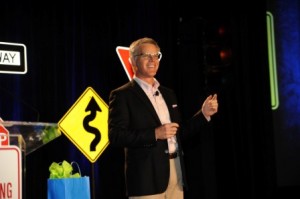By Ginny Cooper

Why should we care about branding? The usual response is often that branding is the frou-frou, the icing on the cake, not the cake itself. McKee contends that brand is the single most valuable asset any company owns. It’s unique, unlike any other asset. Other assets depreciate over time, but a brand, properly managed, need never depreciate; it appreciates. People misunderstand what brands are. The brand and the business are inextricably intertwined.
Cautioning the audience that he was “going to say nothing new today, nothing you don’t already know,” McKee shared his Power Branding Principles. Here are excerpts from three of them.
Meta Principle 1 – Power Brands Employ Insightful Analysis
It doesn’t matter what you think, it matters what they think. We are not rational beings, we are emotional beings, and we “think” with our emotions first. McKee uses the acronym CERT to explain how we analyze and make buying decisions.
Context: the purchase process itself can change the purchase process.
The example McKee gave was a personal one, of buying a basketball shoe for his son. His son chose a Nike shoe promoted by Dennis Rodman. Wanting his son to emulate a better role model, McKee steered him toward a Grant Hill shoe.
Car purchases are another good example of how a purchase decision is driven by emotions.
The context sets the expectations.
Expectations: research is a compass, not a map
A study conducted at the University of Michigan proved that the expectation of a Hershey’s Kiss being the “last” piece of chocolate to be eaten was more enjoyable than the “next” piece of chocolate to be consumed.
A study conducted at CalTech proved that price influences perception when three kinds of wine were poured into five glasses and assigned five different price points. Participants rated the highest-priced wine as the best, regarding price as an indicator of value.
Endeavoring to prove that mind-set matters, Harvard conducted a study of hotel maids, giving each maid a physical exam. One group was told how many calories they would burn with each task they accomplished; the other was not. When the groups were re-examined, the first group (told how many calories they would burn) had lower blood pressure readings, lower body mass index, and other indicators of better health.
Risks: expectations set our risk profile
Trust is built on familiarity and destroyed by exploitation. Branding is built on trust.
If you know it and they know it, admit it. Examples given: Avis rental cars’ iconic “We Try Harder” campaign; fictional spokesman Joe Isuzu, a pathological liar used in a series of television advertisements for Isuzu cars and trucks.
Tradeoffs: try to mitigate risk by tradeoff; people don’t always know why they do what they do but that doesn’t mean they don’t do it
- Shortcuts – complexity is the enemy of comprehension
- Don’t use bullet points!
- People settle on the middle
- Brand = shortcut
- Operate within their context
Meta Principle 2 – Power Brands Pursue Transcendent Relevance
- The way it has always been done is not the way it always needs to be done
- The Internet of things…1 percent of what can be connected IS connected – Cisco
- Good intentions don’t justify bad strategy
- You have two minutes to cut your rates and two years to get them back
- In the price/value equation it’s the denominator that counts
- Raising your price may actually enhance your appeal (Example: Michelin tires)
- Your most important target audience is the people who have your brand on their name tags (employee culture); “Culture eats strategy for breakfast” – Peter Drucker; “Control the media and you’ll control the culture” – Francis Schaeffer
- Contradiction kills credibility – You can’t be a luxury brand and set up outlets
Meta Principle 3 – Power Brands Use Executional Inventiveness
- Be careful that your promise isn’t seen as a dare
- The lines between journalism, advertising, and entertainment are becoming increasingly blurred
- American Idol is a 17-week long ad
- The Lego Movie is a 90 minute commercial
- Farmed and Dangerous on Hulu is Chipotle Mexican Grill’s webisode series
- If you have to offer someone a discount to do business with you, that’s not loyalty. Good examples of brand loyalty:
- HOG (Harley Owners Group)
- Chick-fil-A
- Win the heart and the mind will follow; the emotions outlast the events that generate the emotions. Good examples:
- Proctor & Gamble’s “Thank You Mom” campaign during Olympics
- Dos Equis’ “Most Interesting Man in the World”
McKee closed by asking and answering three questions:
What is branding?
- What ISN’T branding? Nothing is not branding.
Who controls the brand?
- Nobody
When is branding done (finishes)?
- Never
We have our work cut out for us!
 ABOUT STEVE McKEE
ABOUT STEVE McKEE
Steve McKee is the president of McKee Wallwork & Company, an integrated marketing firm that specializes in revitalizing stalled, stuck and stale brands.
A columnist for Businessweek.com since 2003, McKee is also the author of When Growth Stalls: How it Happens, Why You’re Stuck and What To Do About It, an award-winning business book now published in four languages. His new book, Power Branding:Leveraging the Success of the World’s Best Brands, was released by Palgrave Macmillan in January.
A marketing strategist for nearly 30 years, McKee has held executive positions at notable agencies including NW Ayer, Della Femina and a division of McCann-Erickson Worldwide. McKee Wallwork & Company has made the Inc. 500 list of the fastest-growing private companies in America and has twice won the prestigious Effie Award for marketing effectiveness from the American Marketing Association. McKee has been published or quoted in The New York Times, USA Today, Advertising Age, Adweek, Investor’s Business Daily and The Los Angeles Times, among others, and he has appeared on CNBC, ESPN2, CNNfn, Bloomberg and network television affiliates across America.

